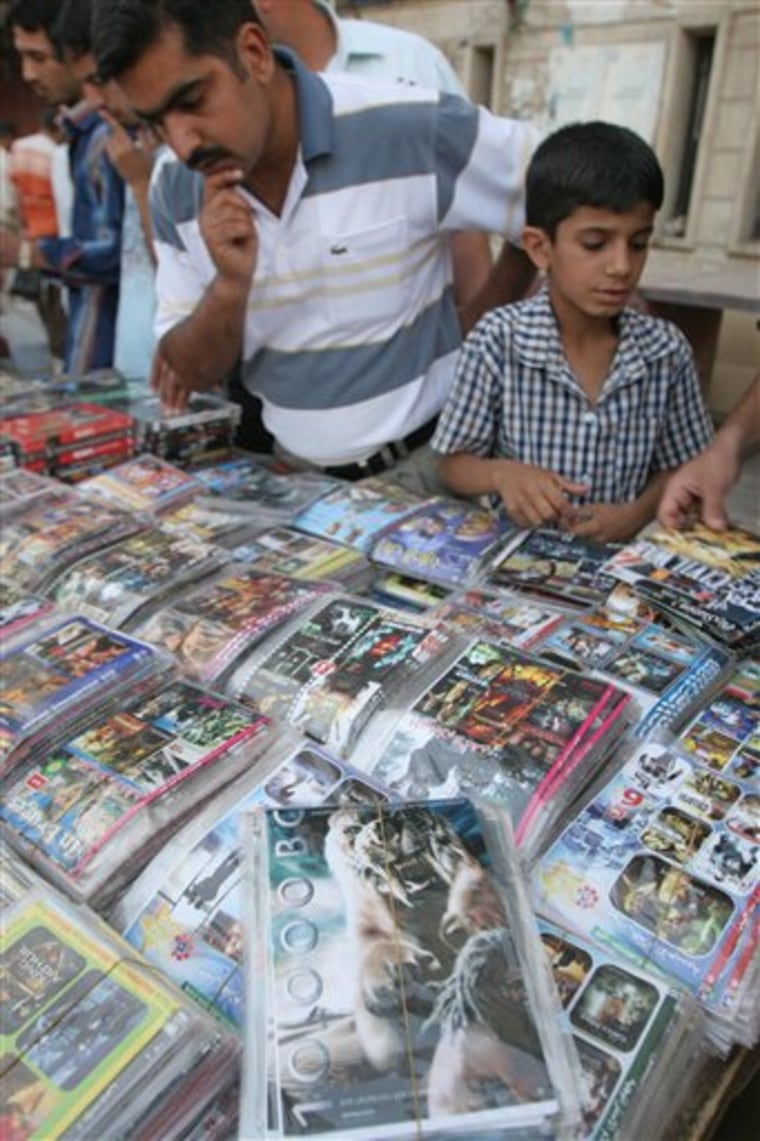CD shops sell love songs again. Some women emerge from their homes without veils, and alcohol sellers are coming out of hiding in the southern city of Basra — where religious vigilantes have long enforced strict Islamic codes.
The changes in recent weeks mark a surprising show of government sway — at least for now — after an Iraqi-led military crackdown that was plagued by desertions, ragged planning and ended in a virtual stalemate with Shiite militias in Iraq's second-largest city.
But it's unclear whether the new tone in parts of Basra represents a permanent tilt toward the Iraqi government or just a temporary retreat of Shiite hard-liners challenging the current Baghdad leadership.
During five days of heavy fighting last month, Iraqi troops struggled against militiamen, particularly the Mahdi Army loyal to anti-U.S. cleric Muqtada al-Sadr. The military was plagued by desertions and poor organization — and, in the end, the offensive was inconclusive with Iran helping mediate a truce.
Still, the crackdown appears to have succeeded in giving some sense of government control in Basra.
Two Associated Press employees in Basra interviewed several shopkeepers and other residents on the lifting of some lifestyle restrictions imposed by Shiite hard-liners. The AP also toured four districts around the city to observe the recent changes.
For years, militiamen and vigilantes have had nearly a free hand in Basra. They intimidated, attacked and sometimes killed residents who broke the strict social rules in the city — once known for its liberal lifestyles and nightlife.
Walid Khalid had to stop selling alcohol in 2005 after gunmen snatched his brother from their home and dumped him hours later in the street with gunshots to both legs.
But the two brothers resumed their business in the past days, feeling safer after the crackdown launched March 25.
"Now, I have resumed my business and I am selling alcohol in a street in central Basra near an army checkpoint," Khalid told the AP.
Prime Minister Nouri al-Maliki ordered the offensive in Basra in a bid to confront what he called Shiite gangs and criminals. Basra is also critical for the government as the commercial hub of the nation's southern oil fields.
Allies called into the fight
The assault stalled as Mahdi Army fighters put up unexpected resistance, and at least 1,000 soldiers and many police refused to fight — either because they were intimidated by the militias or were loyal to al-Sadr.
The military had to rush in reinforcements from other parts of Iraq and call for help from the British and the Americans. U.S. and British aircraft launched airstrikes and ferried wounded Iraqi soldiers to hospital.
Since the truce, government forces have continued raids and arrests, but in a more low key way. More than 400 militiamen and criminals have been arrested since the sweep began, the Interior Ministry said.
It is unclear whether the decreased presence of militiamen in the streets is because they were dealt a real blow or just a tactic to lie low for the time being. The Mahdi Army in Basra remains in control of its stronghold district of Hayaniyah and other small areas _ and it and other militias, all with political backers, retain enormous influence in the city.
Security forces are pushing hard to convince Basra residents they have broken the militias' hold. Checkpoints have been set up on main streets and intersections, with increased patrols in other areas.
'Basra will not be a sad city'
State TV showed police cars decorated with streamers and flowers circulating the streets broadcasting music through loudspeakers, and top commanders walking around, chatting with pedestrians and shopowners, telling them not to be afraid of gangs.
Interior Ministry spokesman Maj. Gen. Abdul-Karim Khalaf told the AP the crackdown will continue till "Basra is back to its glorious joyful days."
The people in Basra "will forget the dark ages they lived during the past years. Basra will not be a sad city anymore," Khalaf said, speaking from the city.
Muhanad Jawad, owner of a CD shop, said that before the crackdown, bearded men wearing black clothes frequently raided his shop to look for banned love songs or romantic Western or Egyptian movies. Gunmen would order him to sell only CDs with songs or video mourning Imam al-Hussein, a revered Shiite martyr in the 7th century.
"Now, the situation is better. The fanatic gunmen have vanished and a lot of young people are visiting my shop to buy songs, pop music and romantic movies," he said.
In the city's main street, Al-Jazir, several CD shops have been opened and music is played loudly outside the stores while unveiled young women pass by. Although not fully covered by a traditional veil, most women nonetheless wear head scarves over their hair.
Mohammed Abdul-Amir, a government employee, dared to hire a singer and a band for his wedding four days ago.
"I am happy to have a real wedding party," he said. "A few weeks ago, doing such a thing would have meant death."
